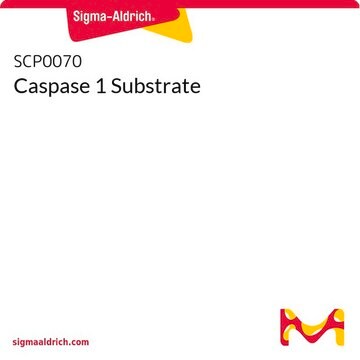SCP0066
Caspase 1 Substrate
≥95% (HPLC), lyophilized
Iniciar sesiónpara Ver la Fijación de precios por contrato y de la organización
About This Item
Fórmula empírica (notación de Hill):
C25H32N4O7
Peso molecular:
500.54
Código UNSPSC:
12352202
NACRES:
NA.32
Productos recomendados
product name
Caspase 1 Substrate,
Análisis
≥95% (HPLC)
formulario
lyophilized
composición
Peptide Content, ≥80%
condiciones de almacenamiento
protect from light
temp. de almacenamiento
−20°C
Amino Acid Sequence
Ac-Val-Ala-Asp-4-methoxy-2-naphtylamide
Aplicación
Caspase 1 is a cysteine protease activator of inflammatory processes which may be detected using a variety of chromogenic and fluorogenic peptide substrates build around the VAD (val-ala-asp) or WEAD (trp-glu-ala-asp) sequences. These substrates include: Ac-VAD-pNa (acetyl-Val-Ala-Asp-p-nitroanalide), chromogenic; Ac-VAD-AFC (acetyl-Val-Ala-Asp-AFC), fluorogenic; Ac-VAD-4-methoxy-2-naphtylamide (acetyl-Val-Ala-Asp-4-methoxy-2-naphtylamide); Ac-WVAD-pNa (acetyl-Trp-Val-Ala-Asp-p-nitroanalide), chromogenic; Ac-WVAD-AMC (acetyl-Trp-Val-Ala-Asp-7-amino-4-methylcoumarin), fluorogenic; Ac-WEAD-pNA (acetyl-Trp-Glu-Ala-Asp-p-nitroanalide), chromogenic; Ac-WEAD-AMC (acetyl-Trp-Glu-Ala-Asp-7-amino-4-methylcoumarin), fluorogenic; and MCA-YVADAP-DNP-K (MCA-Tyr-Val-Ala-Asp-Ala-Pro-DNP-Lys).
Código de clase de almacenamiento
11 - Combustible Solids
Clase de riesgo para el agua (WGK)
WGK 3
Punto de inflamabilidad (°F)
Not applicable
Punto de inflamabilidad (°C)
Not applicable
Certificados de análisis (COA)
Busque Certificados de análisis (COA) introduciendo el número de lote del producto. Los números de lote se encuentran en la etiqueta del producto después de las palabras «Lot» o «Batch»
¿Ya tiene este producto?
Encuentre la documentación para los productos que ha comprado recientemente en la Biblioteca de documentos.
Jerry Shen et al.
Atherosclerosis, 210(2), 422-429 (2010-01-12)
The preferred amino acids in the proteolytic sites have been considered to be similar between caspase-1 and caspase-9, which do not support their differential functions in inflammatory pyroptosis and apoptosis. We attempted to solve this problem. We analyzed the flanking
Annamaria Vezzani et al.
Current opinion in investigational drugs (London, England : 2000), 11(1), 43-50 (2010-01-05)
Epilepsy is a disabling neurological disorder that is characterized by recurring, unprovoked seizures. Drug-resistant epilepsy affects approximately 30% of individuals with epilepsy; thus, one of the main challenges for epilepsy therapy is the development of alternative anticonvulsant approaches. The discovery
F Martinon et al.
Cell death and differentiation, 14(1), 10-22 (2006-09-16)
Fifteen years have passed since the cloning and characterization of the interleukin-1beta-converting enzyme (ICE/caspase-1), the first identified member of a family of proteases currently known as caspases. Caspase-1 is the prototypical member of a subclass of caspases involved in cytokine
Eve-Lyne Marchand et al.
Circulation research, 92(7), 777-784 (2003-03-08)
Blockade of angiotensin type 1 (AT1) receptors induces smooth muscle cell (SMC) death and regression of aortic hypertrophy in spontaneously hypertensive rats (SHR). We postulated that SMC death and vascular remodeling in this model may be attenuated by z-Val-Ala-Asp(OMe)-CH2F (z-VAD-fmk)
Diana F Silva et al.
Journal of neuroinflammation, 17(1), 332-332 (2020-11-07)
After decades of research recognizing it as a complex multifactorial disorder, sporadic Alzheimer's disease (sAD) still has no known etiology. Adding to the myriad of different pathways involved, bacterial neurotoxins are assuming greater importance in the etiology and/or progression of
Nuestro equipo de científicos tiene experiencia en todas las áreas de investigación: Ciencias de la vida, Ciencia de los materiales, Síntesis química, Cromatografía, Analítica y muchas otras.
Póngase en contacto con el Servicio técnico





